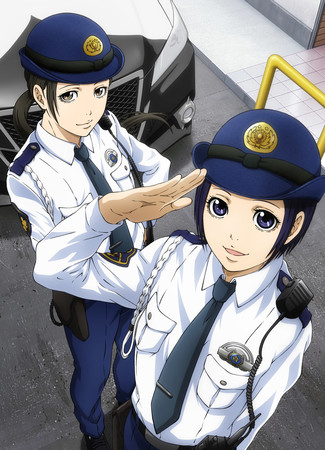Interest
Police in a Pod Manga Creator Shares Her Motivation For Creating the Series
posted on by Kim Morrissy
 The television anime of Miko Yasu's Police in a Pod (Hakozume: Kōban Joshi no Gyakushū) manga premiered on Wednesday, and its portrayal of the mundane struggles of kо̄ban (police box) officers has stood out to some viewers. In a 2018 interview, Yasu explained some of her motivations for drawing the manga: She once served in the police force for approximately 10 years but was saddened by its culture of overwork, and so she hopes to spread understanding about the profession in order to encourage public support.
The television anime of Miko Yasu's Police in a Pod (Hakozume: Kōban Joshi no Gyakushū) manga premiered on Wednesday, and its portrayal of the mundane struggles of kо̄ban (police box) officers has stood out to some viewers. In a 2018 interview, Yasu explained some of her motivations for drawing the manga: She once served in the police force for approximately 10 years but was saddened by its culture of overwork, and so she hopes to spread understanding about the profession in order to encourage public support.
She said that she first joined out of a feeling of empathy towards the families of crime victims. She was mainly a local kо̄ban officer and handled crime prevention publicity campaigns. She ultimately left because when she took childcare leave, the person who filled her role died of overwork. She felt guilty about the burdens shouldered by her colleagues and tried to focus on recruitment efforts after her return to work. However, she was disheartened when she saw a lack of interest among high school children. One boy who did express interest said that he had the impression that the profession was too lofty for someone like him, who struggled to take care of himself.
Yasu wanted to convey that policemen are actually just regular human beings doing their best, and not necessarily upstanding people. She decided that manga would be an accessible way to spread this message. Because she figured that a low-level officer like herself would struggle to get approval to draw a manga for an official ad, she decided to pitch to Kodansha's Morning magazine instead. Although she had experience drawing portraits from her police work, she was initially told that her art was not suited for manga. She quit her job in order to focus on practicing her art to suit the pace of manga serialization.
The interview also highlights how Yasu's personal experiences are depicted in the manga. In one chapter, the female police officers are unable to go to the toilet because they are not allowed to take off their handguns. Unlike male officers, women cannot simply unzip the flyer in their trousers—they would have to take off their handguns. She commented that when she was on duty, she avoided drinking too much water in order to subdue the urge to relieve herself. She said that nowadays there are more male officers who understand these kinds of problems, but that when an incident is at hand, people generally tend to overlook women-specific issues.
In another chapter which was adapted in the first episode of the anime, Mai tells children that a neighborhood that is lax against minor infringements will be perceived as easier pickings to a burglar. Yasu said that this lesson was based on her real-life experience talking to a burglar with repeat offences.
Yasu launched the manga in Kodansha's Morning magazine in November 2017. The series has 2.3 million copies in circulation. Kodansha Comics is publishing the manga in English. The manga was nominated for the 66th Shogakukan Manga Awards in 2020 and the 45th Annual Kodansha Manga Awards in 2021. The manga was also #22 on Da Vinci Magazine's 2021 manga ranking for "Book of the Year."
The police comedy centers on female police officer Kawai, who had enough of a career she wasn't even that into. She was about to hand in her resignation, when the unthinkable happened — she met the new, female director of her station! And after spending a little time with this gorgeous role model, Kawai realizes that maybe she isn't quite done being an officer after all.
The manga previously inspired a live-action television series that premiered on July 7 and ended in September.
Source: Gendai Business via Anime Club Empress